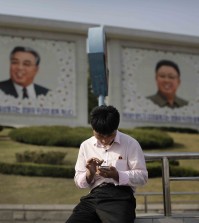- California Assembly OKs highest minimum wage in nation
- S. Korea unveils first graphic cigarette warnings
- US joins with South Korea, Japan in bid to deter North Korea
- LPGA golfer Chun In-gee finally back in action
- S. Korea won’t be top seed in final World Cup qualification round
- US men’s soccer misses 2nd straight Olympics
- US back on track in qualifying with 4-0 win over Guatemala
- High-intensity workout injuries spawn cottage industry
- CDC expands range of Zika mosquitoes into parts of Northeast
- Who knew? ‘The Walking Dead’ is helping families connect
S. Korean mobile carriers fined 2.4 bln won for handset subsidy violations

Signs attached to the entrance wall of a mobile phone retail store in Jongno, central Seoul, that read, “iPhone 6 is immediately available.” The nation’s telecom watchdog threatened to take legal action against CEOs of local mobile carriers for disturbing the telecom market order by providing excessive subsidies for iPhone 6.
( Yonhap)
SEOUL (Yonhap) — South Korean mobile carriers have been fined 2.4 billion won (US$2.15 million) for violating the new handset subsidy law that misled and lured iPhone 6 buyers in late October, the communications watchdog said Thursday.
The Korea Communications Commission (KCC) decided to impose on SK Telecom Co., KT Corp. and LG Uplus Inc. a penalty of 800 million won each, at a meeting held earlier in the day, it said in a statement.
The move came a week after the KCC sought criminal charges against the three mobile carriers over paying subsidies far over the limit to retail stores to woo more customers at the time of the new iPhone 6 launch between Oct. 31 and Nov. 2.
It was found that some 452 iPhone 6 subscribers were given at least a 500,000 won subsidy, which prompted hundreds of people to line up to get the new Apple Inc. handset.
The watchdog had warned that there would be stern measures since the violation came less than a month after the new handset law, which restricts the amount of incentives to no higher than 300,000 won per device, was enacted from Oct. 1.
For the first time, the KCC also decided to fine retail stores responsible for selling the latest iPhone at a cheaper rate, up to 1.5 million won for each distributor, the watchdog said.
The handset law specifies that a violator can be imposed with a penalty equivalent to 10 percent of their annual revenue.















